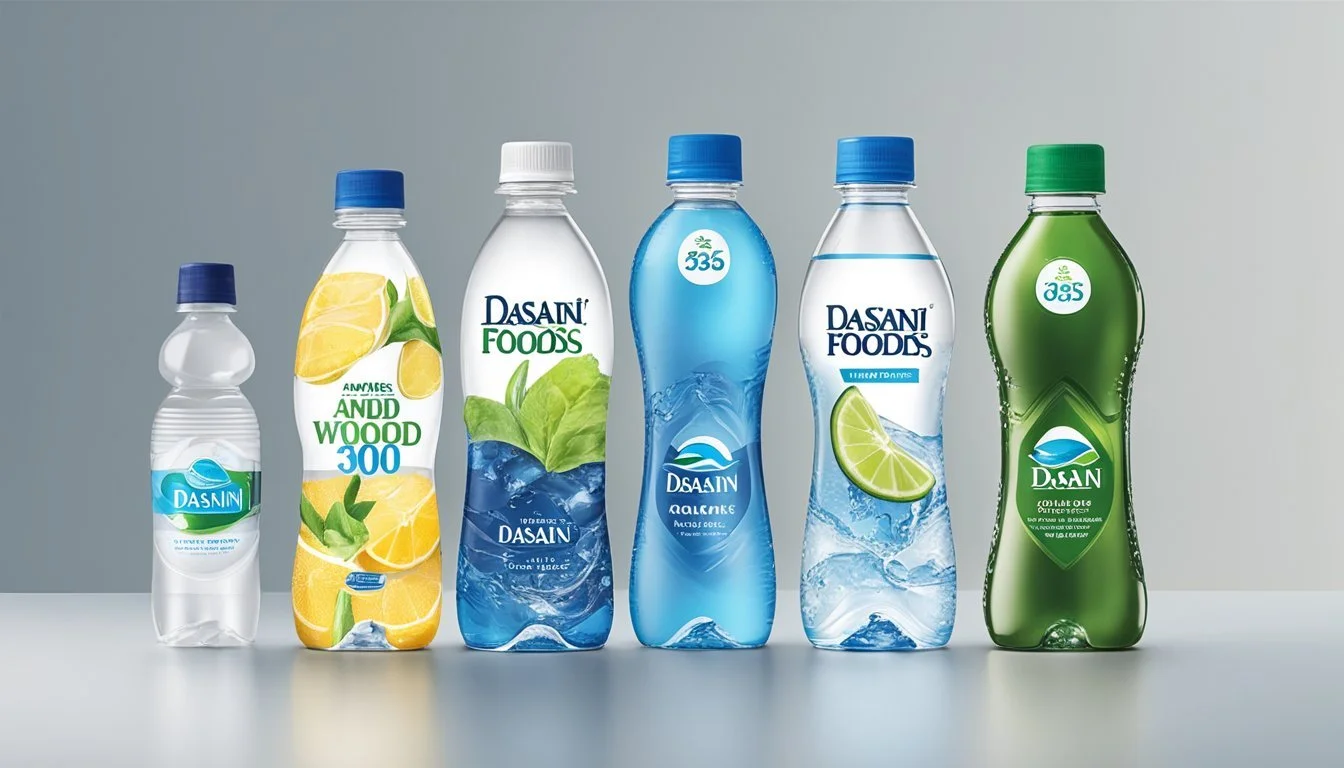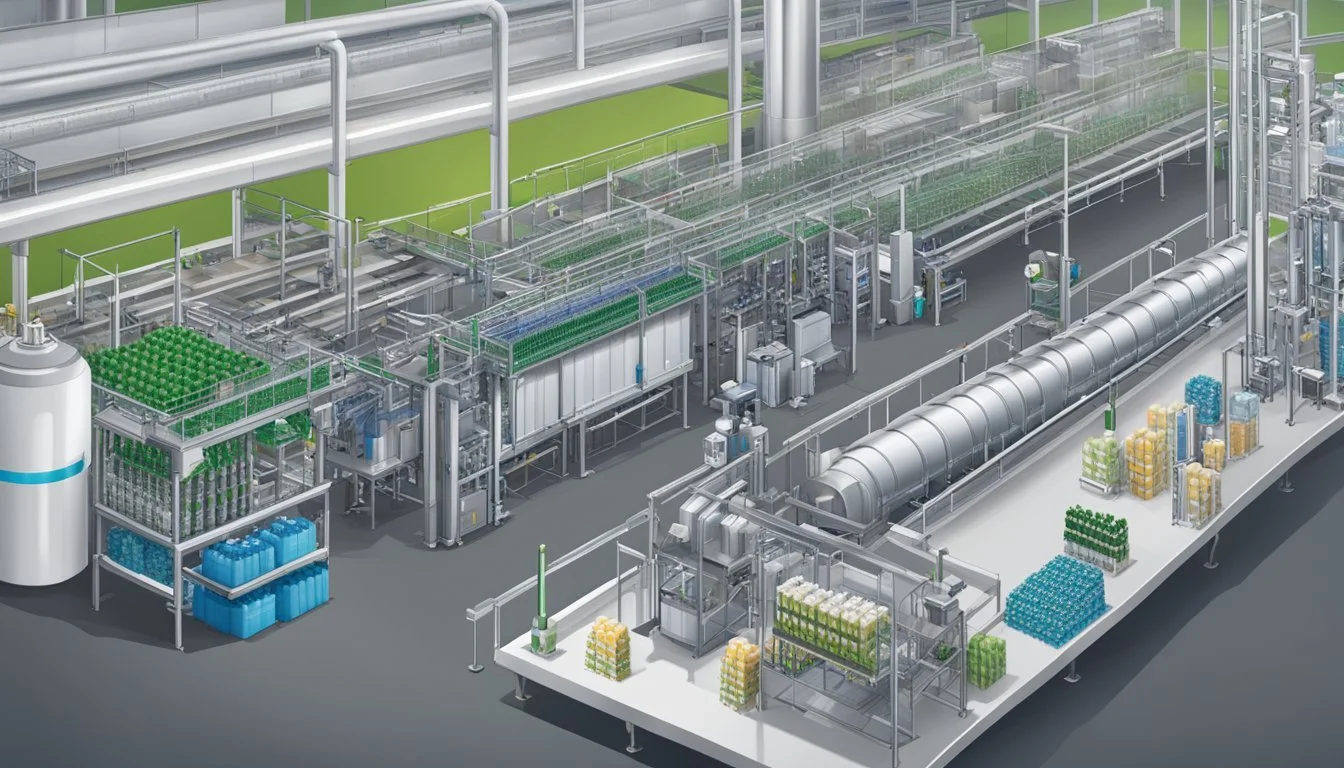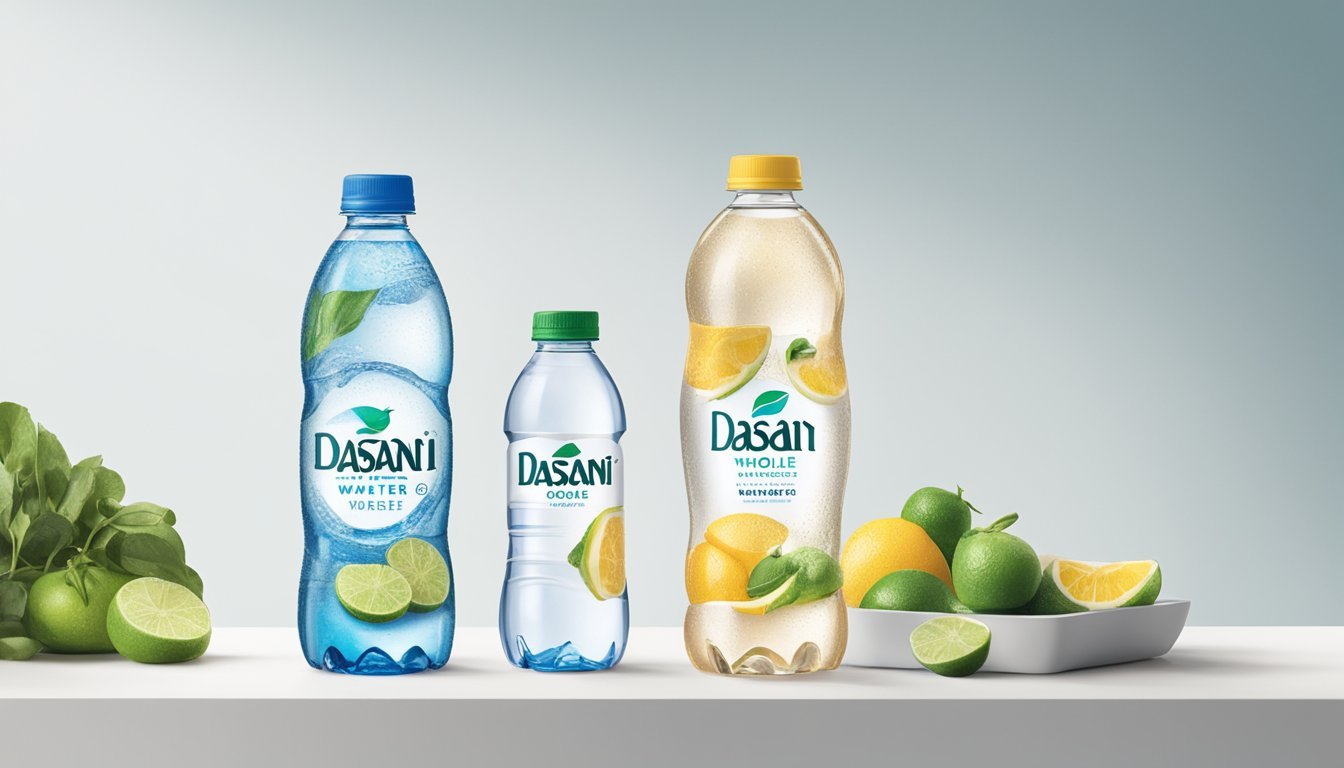Whole Foods 365 vs. Dasani
Which Bottled Water is Better?
Choosing between Whole Foods 365 and Dasani can be tricky for anyone who is keen on selecting the best bottled water. As numerous options crowd the market, it's vital to understand the differences and benefits each brand offers. Whole Foods 365 stands out due to its commitment to natural sourcing, providing water that is clean and free from artificial additives.
Dasani, meanwhile, brings its own set of attractions, backed by the reliability of its parent company, Coca-Cola. Despite negative perceptions around 2020, Dasani has continued to maintain its spot as a popular choice. Dasani's process includes adding minerals for taste, which appeals to those who prefer a distinct flavor profile in their water.
Ultimately, the choice hinges on personal preference for sourcing and taste. Whole Foods 365 provides a straightforward, natural option, while Dasani offers a mineral-enhanced alternative. This article will detail the specific qualities of each to help you make an informed decision.
Assessing the Water Sources
Understanding the differences in water sources is crucial when comparing Whole Foods 365 and Dasani. This can present variations in taste, mineral content, and environmental impacts.
Natural Spring Versus Municipal Sources
Whole Foods 365 water primarily comes from natural springs. This source provides water that typically contains natural minerals and may offer a fresh taste.
In contrast, Dasani sources its water from municipal supplies. This means the water is initially the same as tap water, which is then purified through various processes like reverse osmosis.
Natural spring water often retains naturally occurring minerals such as calcium and magnesium. Municipal sources undergo purification that strips most minerals before re-mineralization.
Environmental Impact of Water Sourcing
Sourcing from natural springs can have various environmental impacts. Over-extraction from these sources can lead to depletion and affect natural ecosystems. However, spring water bottling tends to be closer to the source, which can reduce transportation emissions.
Municipal sources, like those used by Dasani, can have different environmental concerns. The energy-intensive purification and bottling processes contribute to a larger carbon footprint. Moreover, reliance on public water supplies can strain local resources.
Choosing between natural springs and municipal sources involves considering both public health aspects and the broader environmental footprint. Whole Foods 365 may have a different set of environmental challenges compared to Dasani, reflecting their respective sourcing strategies.
Bottled Water Quality and Safety Standards
When comparing Whole Foods 365 and Dasani, it is important to consider bottled water quality and safety standards. This involves looking at regulation by federal agencies and findings from independent consumer tests.
FDA and EPA Regulations
The Food and Drug Administration (FDA) and the Environmental Protection Agency (EPA) are the primary bodies that regulate bottled water quality and safety in the United States.
The FDA oversees bottled water as a packaged food product. It ensures that the water meets safety standards similar to those set by the EPA for tap water. Regulations cover contaminants such as lead, arsenic, and heavy metals.
Both agencies require regular testing. The FDA mandates specific limits on contaminant levels to minimize health risks. Despite these measures, concerns about PFAS chemicals and other harmful substances in bottled water have led to increased public scrutiny.
Consumer Reports Findings
Independent investigations by Consumer Reports provide key insights into the quality and safety of bottled water. A recent study tested 47 brands, including both carbonated and non-carbonated varieties, and found PFAS chemicals in some.
Consumer Reports discovered that some brands exceed recommended safety levels, posing potential health risks. Pregnant women, nursing mothers, and infants are advised to avoid these products. These findings highlight the importance of transparency and stringent quality controls.
A noteworthy point for consumers is the variance in pH levels and mineral content across different brands. Brands like Whole Foods 365 and Dasani need to adhere strictly to standards to ensure safe drinking water for the public.
Production Processes and Water Purity
Whole Foods 365 and Dasani employ different methods in processing and purifying their bottled water, focusing on removing contaminants and improving taste. Both brands highlight their commitment to ensuring high purity levels.
Filtration and Purification Methods
Whole Foods 365 uses a multi-step filtration process. This generally includes reverse osmosis, a technique known for effectively removing impurities and minerals. Additionally, activated carbon filters may also be used to absorb organic molecules and chlorine, thereby improving taste.
Dasani employs a similar approach, starting with tap water that undergoes reverse osmosis filtration. This method is effective in eliminating a broad array of contaminants. Post-filtration, Dasani adds a blend of mineral salts for taste enhancement.
These purification processes ensure that the water you consume is free from most harmful substances, although they have different approaches to finalizing the product. Regular testing and adherence to stringent standards, including voluntary guidance from health authorities, are an integral part of both brands' processes.
Assessment of Contaminants
Both Whole Foods 365 and Dasani emphasize the importance of purity and safety in their bottled water. Regular testing for contaminants like PFAS (Per- and Polyfluoroalkyl Substances) is crucial. PFAS are a group of chemicals known for their durability and resistance to breaking down in the environment, posing significant health risks.
Whole Foods 365 complies with own strict standards, often surpassing local water quality requirements to ensure minimal contaminant levels. Dasani, backed by The Coca-Cola Company, follows similarly rigorous testing protocols.
Both brands aim to deliver purified water that meets high safety standards. By employing advanced filtration processes, they provide consumers with water that is generally safer and cleaner compared to standard tap water.
Composition and Health Aspects
Whole Foods 365 and Dasani water both have distinct compositions that influence their health impacts. This section discusses their minerals and electrolytes content, pH levels, and potential health benefits and risks.
Minerals and Electrolytes Content
Whole Foods 365 water is known for its minimal mineral content, providing a pure taste that appeals to those who prefer water without additional flavors. It does not list specific electrolytes on its label.
Dasani water, on the other hand, includes added minerals like magnesium sulfate, potassium chloride, and salt. These minerals are intended to enhance taste and provide some electrolyte content. However, the levels are relatively low and may not significantly impact electrolyte balance.
PH Levels and Body Hydration
The pH level of water can affect how it's absorbed and how it tastes. Whole Foods 365 water typically maintains a neutral pH around 7, which supports its clean, neutral taste and can be suitable for everyday hydration.
Dasani water generally has a pH around 5-7, slightly acidic due to the added mineral salts, which can influence its taste profile. Some believe that slightly acidic water is less effective for hydration compared to neutral or alkaline water, though scientific evidence is mixed.
Health Benefits Versus Risks
For health benefits, Whole Foods 365 offers the advantage of low contaminant risk, as it is sourced and purified to high standards. It avoids the inclusion of controversial additives, making it a straightforward hydration choice with minimal health risks.
Dasani, with its added minerals, presents a different profile. While minerals contribute to taste and minor electrolyte content, some concerns exist about additives like magnesium sulfate, which in high amounts can cause health issues like gastrointestinal discomfort. Additionally, Consumer Reports highlighted potential contamination risks, such as PFAS, occasionally found in some bottled waters, emphasizing the need for vigilance in choosing bottled water brands.
Taste and Personal Preference
When comparing Whole Foods 365 and Dasani bottled water, taste and personal preference play significant roles in consumer choice. Understanding the unique flavor profiles and the insights from water sommeliers can help consumers make informed decisions.
Flavor Profiles of Bottled Water
Consumers often notice subtle differences in the flavor of bottled water. Whole Foods 365 boasts a clean and mild taste, attributed to its source from natural springs. The mineral content in this water includes calcium, magnesium, and potassium, giving it a slightly sweet undertone.
Dasani, on the other hand, has a crisper taste due to added minerals like magnesium sulfate, potassium chloride, and table salt. These additives enhance flavor but might also be perceived as slightly artificial by some. Minerals play a crucial role in defining each brand's flavor, influencing preferences based on individual palates.
The Role of a Water Sommelier
A water sommelier can help identify subtle variances between bottled waters. Natural Spring Water like Whole Foods 365 is often preferred for its purity and natural mineral composition. This can be appealing to those who enjoy a more authentic flavor.
Dasani's approach of adding minerals creates a distinct and more consistent taste. While some consumers appreciate this enhanced profile, others might prefer less processed options. A sommelier's expertise can help navigate these preferences by highlighting the mineral content and additives that contribute to taste differences.
Detailed, unbiased tasting notes from a sommelier can provide valuable insights, enabling consumers to choose a bottled water that aligns with their personal taste preferences.
Environmental and Social Impact
When comparing Whole Foods 365 and Dasani bottled water, it is essential to consider their impact on the environment and society. Both brands have implemented measures to address sustainability and packaging concerns, but there are notable differences between their approaches.
Bottled Water and Environmental Sustainability
Whole Foods 365 emphasizes environmental sustainability by sourcing and producing their bottled water with a focus on minimal ecological footprint. They prioritize using renewable energy in their production processes and aim for high standards in water resource management.
In contrast, Dasani, a Coca-Cola brand, has faced criticism for its environmental impact. Despite efforts to reduce plastic waste, the brand has been scrutinized for resource usage and limited adoption of renewable production methods.
Consumers must weigh these environmental practices when deciding which brand aligns best with their values regarding sustainability.
The Move Towards Eco-Friendly Packaging
Packaging plays a significant role in the environmental impact of bottled water. Whole Foods 365 utilizes recyclable and sometimes glass bottles, which reduce plastic usage and offer a more environmentally friendly option. They actively promote reusable bottles to encourage consumers to reduce waste.
Dasani has also made strides toward eco-friendly packaging, incorporating recycled materials in their plastic bottles and working on innovations to further reduce plastic usage. However, the broader reliance on plastic packaging remains a challenge for the brand in achieving higher sustainability standards.
Understanding the specifics of each brand's packaging policies helps in making informed choices about which bottled water to support.
Consumer Choices and Market Varieties
Consumers today have a myriad of bottled water options, with choices ranging from different water sources to carbonated versus non-carbonated varieties. This diversity caters to various preferences and health considerations.
The Expanding Bottled Water Market
The bottled water market features a wide range of brands and types. Whole Foods 365 and Dasani are just the beginning. Dasani, produced by Coca-Cola, primarily offers purified water. Whole Foods 365 provides spring water, often perceived as more natural.
Brands like Aquafina and Poland Spring also specialize in purified and spring waters, respectively. Nestlé markets both purified and spring waters through its Pure Life and Poland Spring brands. Evian, Fiji, and Core Hydration focus on mineral-rich waters, boasting unique taste and potential health benefits.
Consumers also explore alkaline water brands like Essentia, promising balanced pH levels. These varieties signify shifting preferences towards health and wellness. The diversity ensures there's a suitable option for every taste and requirement.
Choosing Between Carbonated and Non-Carbonated Water
Carbonated water, like Perrier, San Pellegrino, and Topo Chico, offers a fizzy alternative to still water. Dasani and Whole Foods 365 primarily offer non-carbonated options, but Dasani does have a range of flavored sparkling waters.
La Croix, bubly, and Canada Dry emphasize flavored carbonated waters, catering to those who enjoy a bubbly zest. Carbonated waters often serve as a soda alternative, providing satisfaction without sugary downsides.
Non-carbonated waters, including smartwater and Deer Park, remain popular for everyday hydration. Preferences between carbonated and non-carbonated depend on taste, health considerations, and intended use, providing ample choices for consumers.
Packaging and Branding Dynamics
Whole Foods 365 and Dasani have distinct approaches to branding and packaging that significantly influence consumer perceptions and choices. These differences are reflected in their market strategies and the visual appeal of their products.
The Influence of Branding on Consumer Choices
Dasani has recently rolled out refreshed packaging as of April 2024. This new look aims to create a lighter, more eye-catching visual identity system (VIS). The revamped design features modern aesthetics and aims to appeal to a broader market segment. The brand's consistent use of blue tones and sleek, minimalist design elements aim to communicate purity and reliability.
Whole Foods 365 adopts a more utilitarian approach with its packaging. The designs often emphasize simplicity and clarity, reflecting the brand's focus on straightforward, honest products. The use of eco-friendly materials in their packaging can appeal to environmentally conscious consumers, aligning with Whole Foods' reputation for sustainability and healthfulness.
Both brands’ branding choices impact their appeal, with Dasani's sleek and modern design contrasting with the more minimalistic and eco-friendly approach of Whole Foods 365. This can influence buying decisions based on consumer values and aesthetic preferences.






